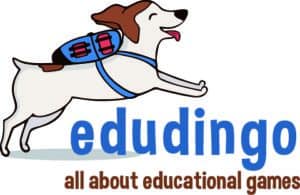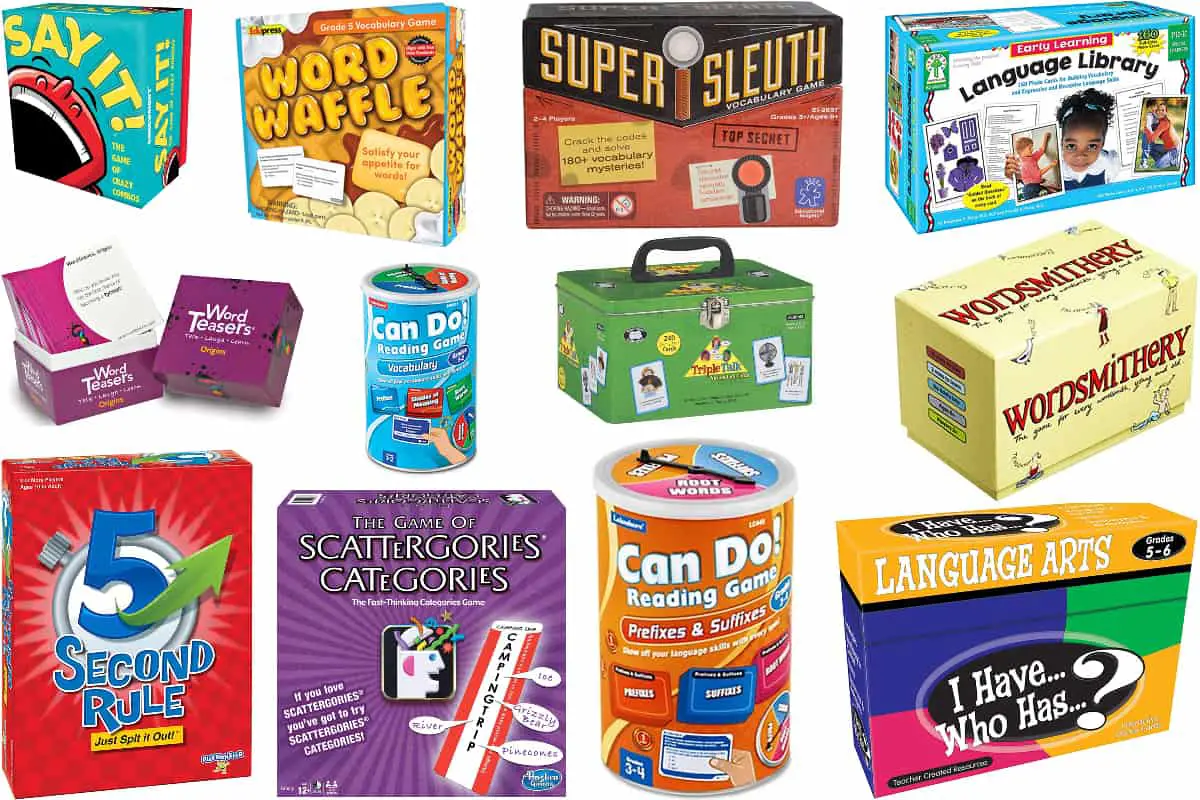This post contains affiliate links.
Vocabulary card games are a fun and easy-to-use way of teaching target vocabulary to preschoolers and elementary students. But their practical usefulness greatly depends on how they are used, for example:
- Whether there is enough repetition (especially for unknown words)
- If the words appear in context (other related words, visual context, examples of use of the word…)
- Whether the rules make you actually use the words (nothing beats pratice to ensure that a new notion is firmly remembered)
- Whether you can target specific words that you want to teach, etc…
Needless to say, the existing games on the market do not have all these qualities, and I was really curious to know and share with you which ones fare best in this regard (in my opinion of course).
The vocabulary card games in this table are arranged according to the learner’s age range. I hope that this comparison table will help you find the best game for your family or class.
| Game | Age | Players | For | Price | Rating |
| English Vocabulary Builders | 4-6 | 2-6 | Families | $$$$ | ★★☆☆☆ |
| Can Do! Vocabulary | 6-8 | 2-4 | School | $$ | ★★★☆☆ |
| Super Sleuth | 8-12 | 2-4 | School | $$ | ★★★☆☆ |
| Triple Talk Vocabulary Cards | 7-9 | 2-4 | School | $$$ | ★★★★☆ |
| Can Do! Prefixes & Suffixes | 8-10 | 2-4 | School | $$ | ★★★★☆ |
| Just for Laughs | 8+ | 2-4 | Families, School | $$$ | ★★★★☆ |
| Classwords | 7-11 | 2-8 | School | $$ | ★★★☆☆ |
| Word Waffle | 10-11 | 2-4 | Families | $$ | ★★☆☆☆ |
| I Have. Who Has? | 10-12 | 2-4 | School | $$ | ★★★☆☆ |
| Say It! | 10+ | 3-8 | Families | $$ | ★★☆☆☆ |
| Word Teasers | 8+ | 2-10 | Families | $$ | ★★★☆☆ |
| Scattergories | 7+ | 2-4 | Families | $$ | ★★★★★ |
| Wordsmithery | 14+ | 2 | Families | $$$ | ★★★☆☆ |
| Early Learning Language Library | 3-5 | 2-6 | Families, School | $$ | ★★★★☆ |
Can Do! Vocabulary (Lakeshore Learning)
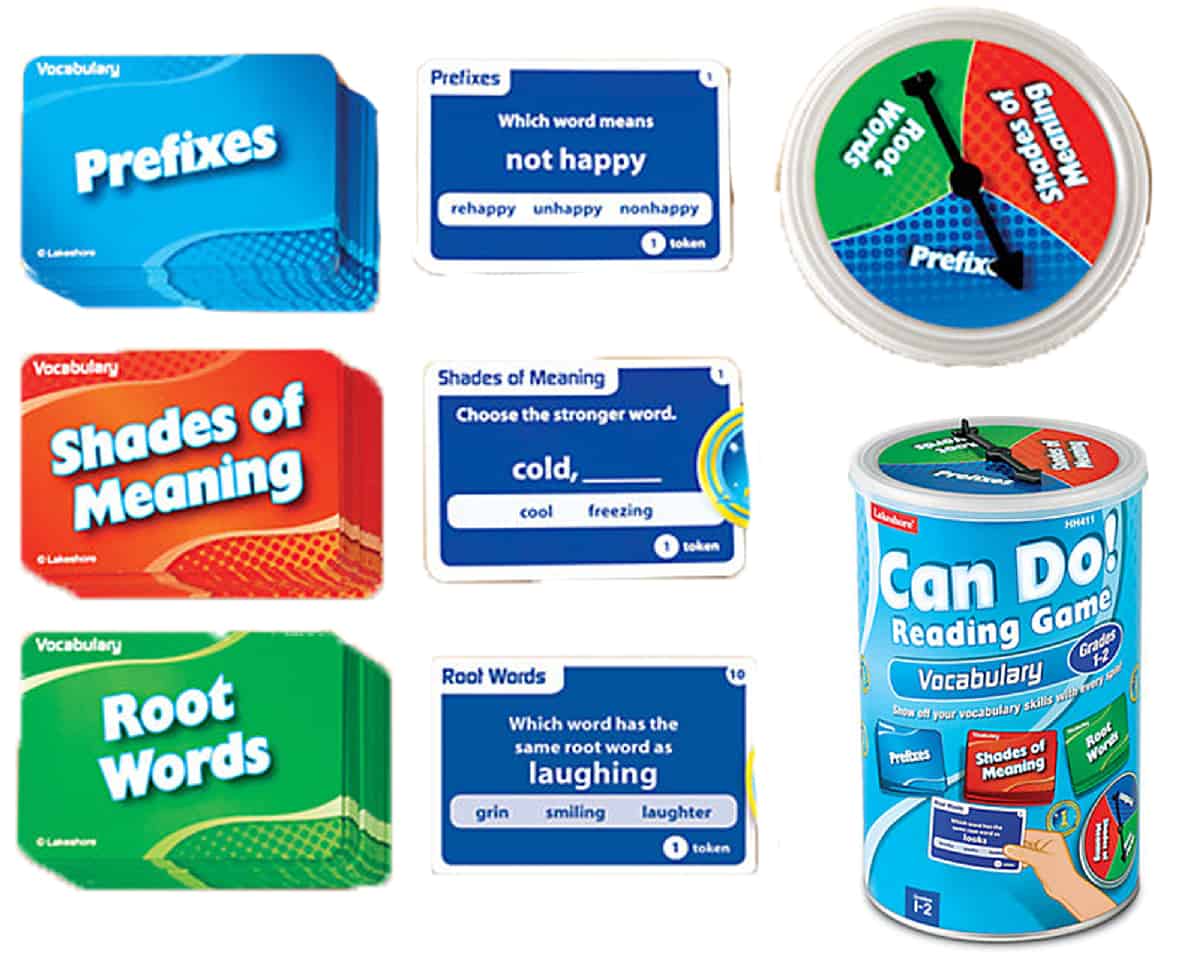
★★★☆☆
For Teachers | Age 6-8 | 2-4 Players | Grade 1-2
In Can Do! Vocabulary Game , players collect tokens as they identify the correct prefix, root word, or shade of meaning.
, players collect tokens as they identify the correct prefix, root word, or shade of meaning.
It contains 60 question cards, 44 game tokens, and a canister. The lid of the canister is used as a spinner.
The first player to obtain 10 tokens wins the game.
I recommend this game with children aged 6-7 years old because
- The multiple choice answers are relevant (not just here for fun but relate to the type of question)
- Answer cards enable self-correction, which is great at school
- The game is rather fast paced and very simple
Classwords (Edupress)
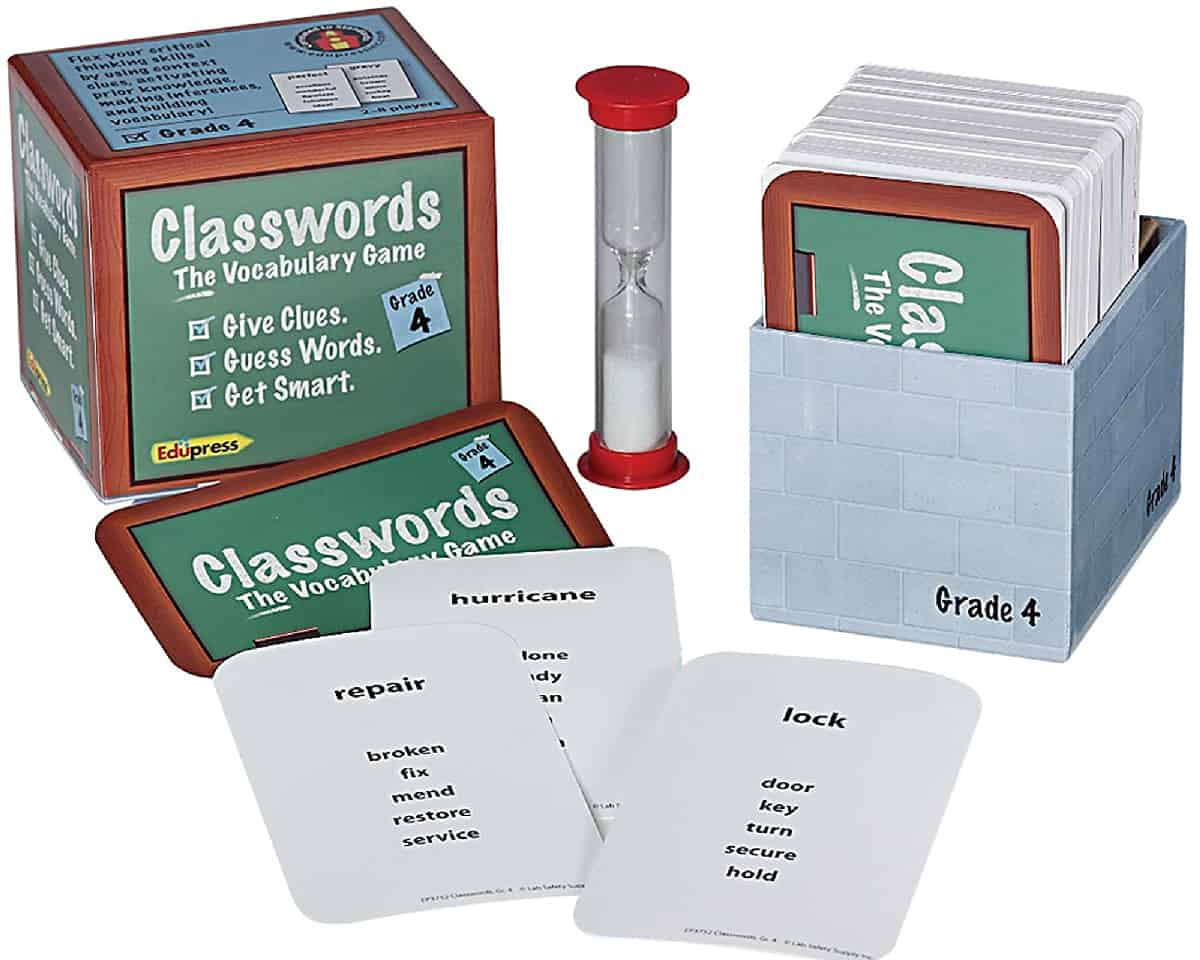
★★★☆☆
For Teachers | Age: 7-11 | 2-8 Players | Grade 2 to 6 according to the version
In Classwords, players have 1 minute to guess the target word through the given clues. Each of the 200 cards has five clues, that players have to read one at a time.
players have 1 minute to guess the target word through the given clues. Each of the 200 cards has five clues, that players have to read one at a time.
This game can be used for practicing vocabulary in short sessions: It is easy to set up and can be played with 2-4 players on each team.
the strong points of the game are that:
- The words of a given card are in the same theme
- The guessing involved is intriguing for the children
- There are versions of the game for grade 2, 3, 4, 5 and 6 (here the Grade 4 version is shown)
Say It! Game (Gamewright)
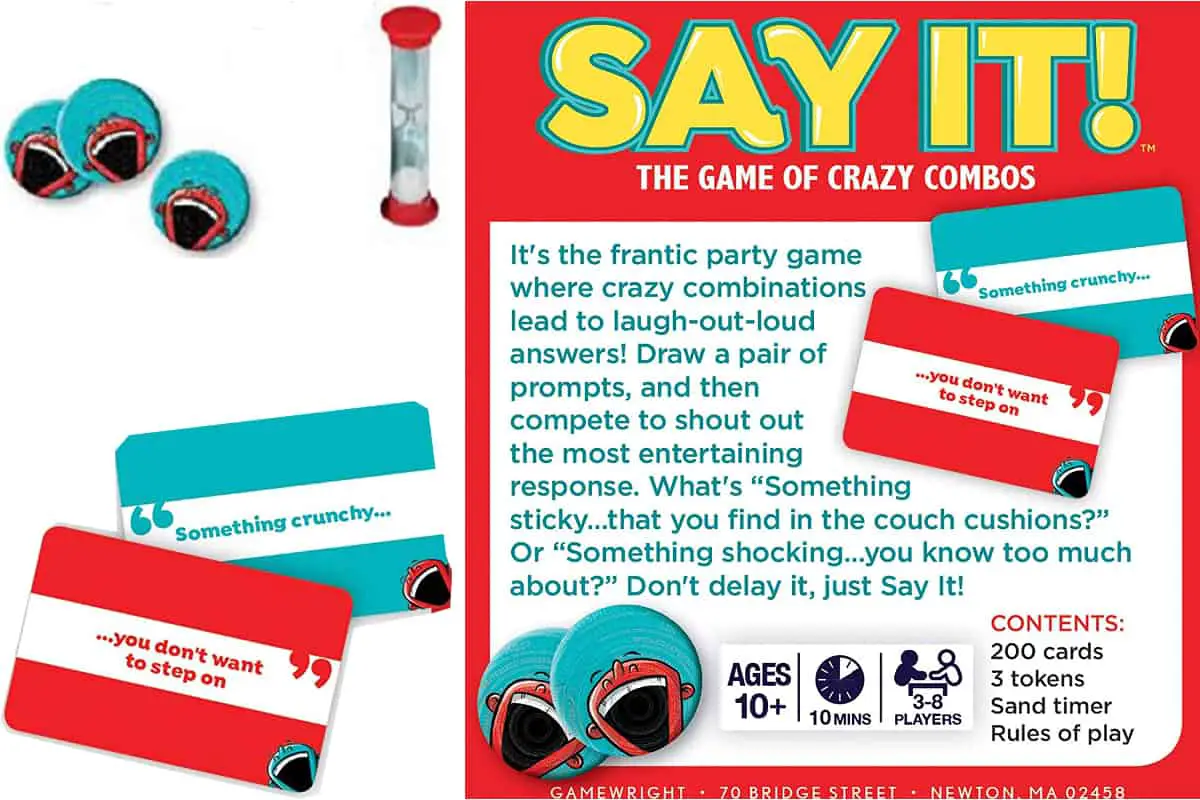
★★★☆☆
For Families | Age 7+ (with my tweak, otherwise 10+) | 3-8 Players
Say It! is a “silly” party game, so you might wonder why I even include it in this list. Well, it is because it is the kind of game that you can play with players of different ages (adults and children from age 10), providing that you tweak the rule a bit to make it less competitive, making it great as a family game.
is a “silly” party game, so you might wonder why I even include it in this list. Well, it is because it is the kind of game that you can play with players of different ages (adults and children from age 10), providing that you tweak the rule a bit to make it less competitive, making it great as a family game.
In Say it, players pick a pair of cards (among 200) and compete to propose an answer that fits the pair of cards within 30 seconds (a timer is included).
For example, the categories are “something sticky “and “that you find in couch cushions”. Tokens are given to players with the most clever or funniest answer. One token is equivalent to one point and the player with the highest score at the end of the game wins.
When you play with younger children, I recommend not using the tokens. This way, you do not count the points, and the aim of the game is just to have fun together. Of course, there is a second, less obvious aim, which is to learn new words from older players.
English Vocabulary Builders Super Deck Card (Strong Learning)
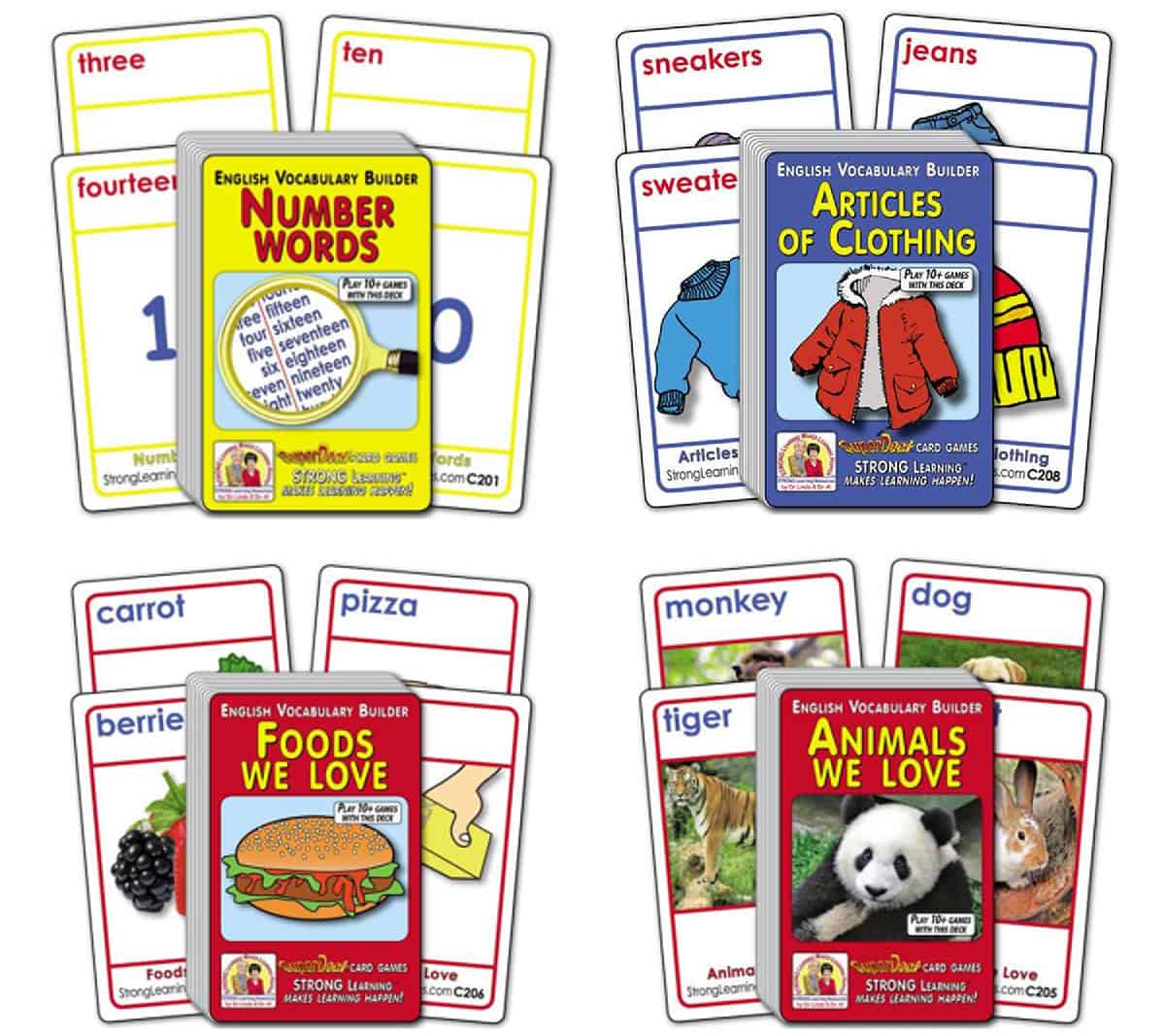
★★☆☆☆
For Families | Age 4-5 | 2-6 Students
English Vocabulary Builders Super Deck features 6 decks of 48 word cards (featuring 24 words each). They can be played using matching games rules such Go Fish, Memory, War, and Old Maid. Each deck has a specific theme:
features 6 decks of 48 word cards (featuring 24 words each). They can be played using matching games rules such Go Fish, Memory, War, and Old Maid. Each deck has a specific theme:
- Animals
- Clothing
- Colors and Shapes
- Foods
- Numbers
- Body
Each deck contains a word list card and an “Old Maid” card.
The sets are relevant for children at pre-kindergarten or Kindergarten because the vocabulary is very simple and should be known by age 5. I do not recommend using them with 6-year-old children as there is no progression in the difficulty of the spelling.
Scattergories Categories (Rejects from Studios)
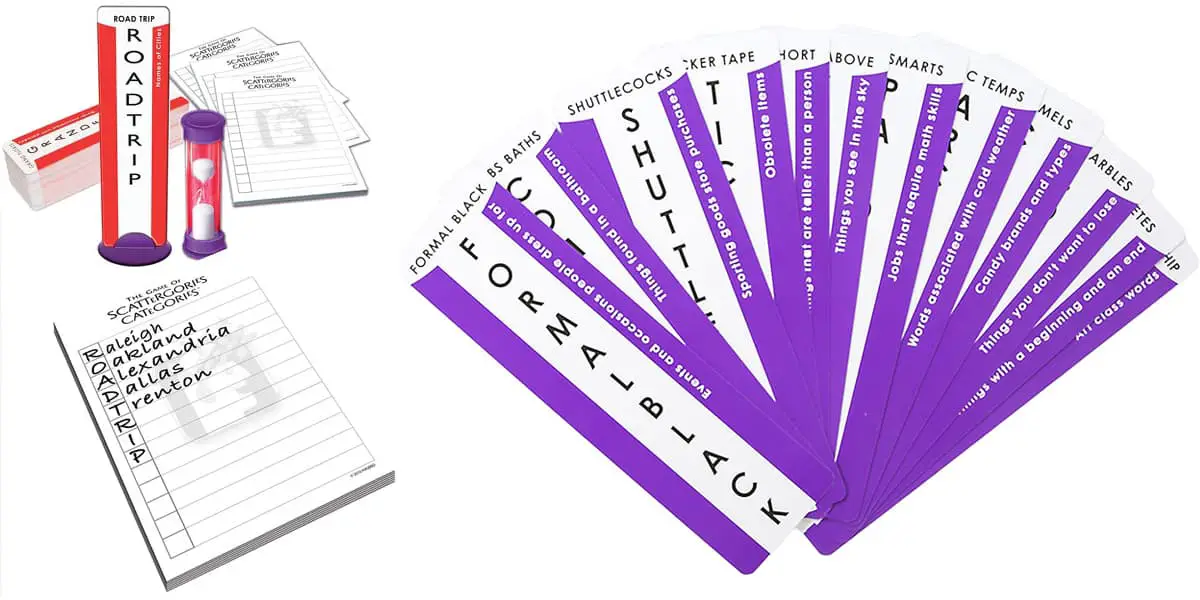
★★★★★
For Families | Age 7+ (with my tweak) | 2-4 Players
In Scattergories Categories , players have 2 minutes (thanks to a sand timer) to find words that:
, players have 2 minutes (thanks to a sand timer) to find words that:
- Start with the letters on the word on the card drawn at the beginning of the round.
- Fit with the phrase
For instance, the word is “MARBLES” and the phrase is “Things you don’t want to lose”. Players must write on the pad things that they don’t want to lose that start with M, A, R B, L, E, and S.
Each answer that does not match another player’s answer scores one point. The first player to obtain 25 points wins the game.
The 125 cards enable to draw 250 words/phrase challenges.
I recommend Scattergories Categories because:
- Phrases can hint to specific themes that you want players to work on. To achieve this, you can keeping in the game only a subset of the 250 words, or invent new “word – phrase” pairs
- The scoring mechanism encourages to propose not too obvious words that nevertheless fit with the phase. This makes it very likely that younger players will learn new words from older ones
- Players can review the words on their pads later (great for debriefing the game)
The problem with players of different ages is that younger players have a much more limited vocabulary and will be at a disadvantage (of course they will be discouraged and will not want to replay the game).
So the standard rule is OK with players from the same age (for example the same class).
I have my “secret sauce”.
To play with children of different ages, just make the number of points required to win depend on the player’s age. I recommend (from 7 Year-old to 15 Year-old) a number of points equal to twice the age minus 5 (for example, 15 points for a 10-year-old). 15 year-olds and older should do 25 points to win.
This tweak enables children as young as 7-year-old to play the game, which was not intended originally (the publisher recommends Scattergories from 10 and up).
I Have. Who Has? (Teacher Created Sources)
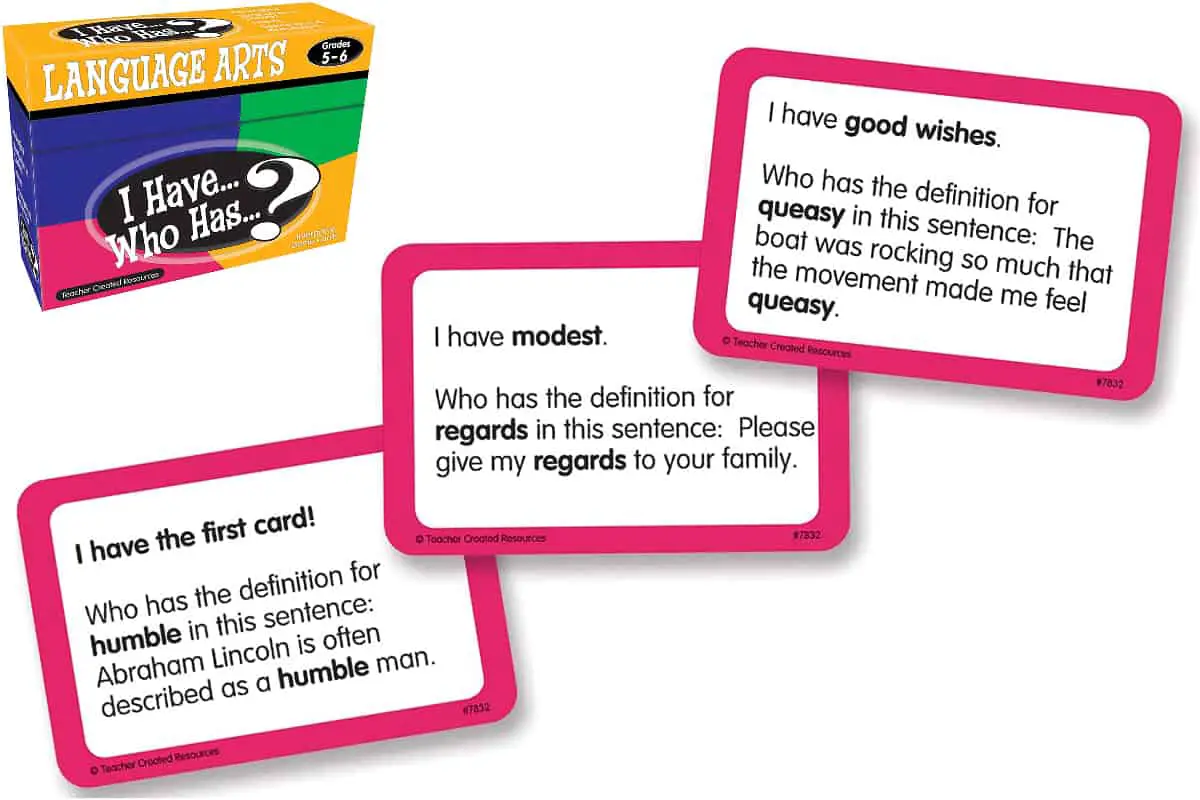
★★★☆☆
For Teachers | Age: 10-12 | 2-6 Players | Grade 5-6
In I Have. Who Has? , players relate words through Analogies, Idioms, compound words, Synonyms, and Antonyms.
, players relate words through Analogies, Idioms, compound words, Synonyms, and Antonyms.
The 37 cards can be used as a warmup or enrichment activity in grades 5 and 6.
“I Have Who Has” is a classic in the classroom, and this one is interesting as there is a real challenge in finding the related word.
Word Teasers (Word Teasers)
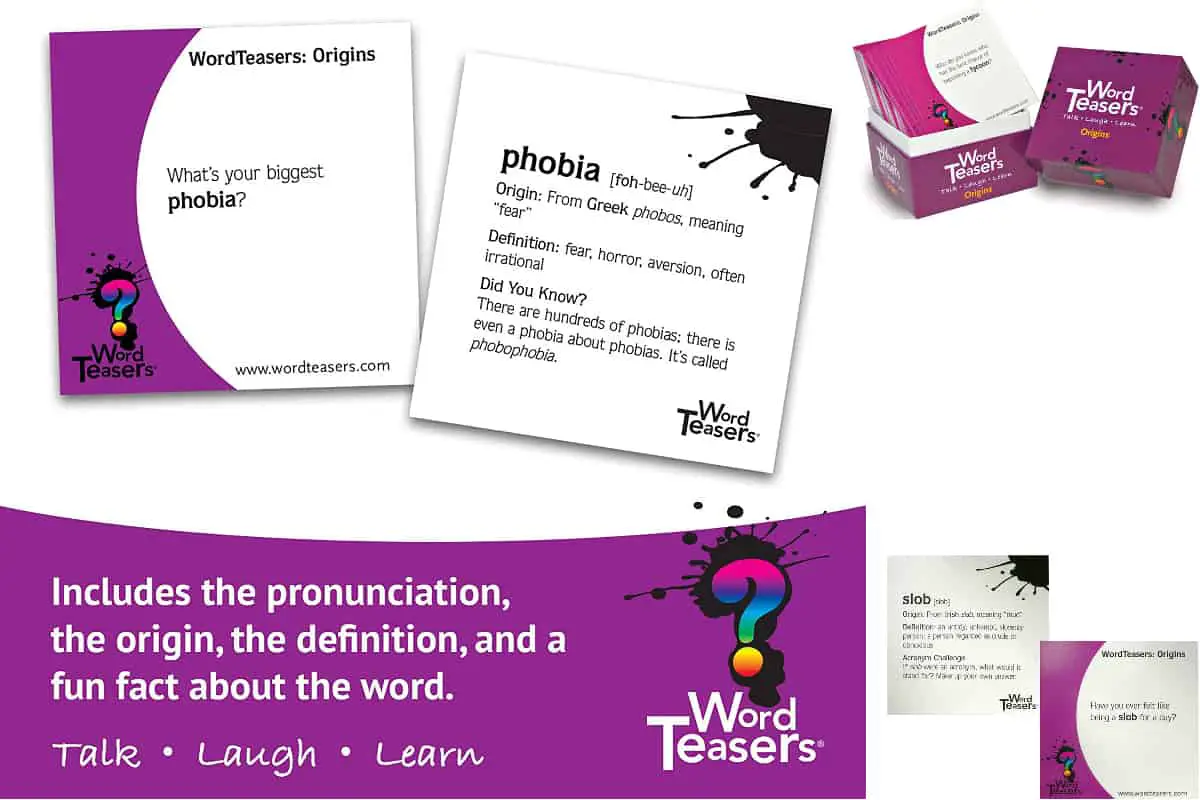
★★★☆☆
For Families | Age: 8+, according to version | 2-10 Players
Word Teasers are sets of 150 words flashcards that help learn the words in three ways :
are sets of 150 words flashcards that help learn the words in three ways :
- As a vocabulary quiz game, using the word’s definition on the back side of the cards (when available)
- As a conversation starter, using the question on the front side of the cards
- As a synonym quiz game, using the list of synonyms (when available)
- Through the other infomation on the card backs, which depends on the version of the set:
- Small Fry (8+): “fun fact”
- Junior (9+), Middle School (11+) & SAT Vocabulary (13+): pronunciation, definition, function and synonyms
- Origins (13+): pronunciation, definition, origin (etymology) and “fun fact”
Although they are just flashcard sets, “Word Teasers” are really valuable because of the information on the cards which is well-chosen, and the versions of the game by age group.
Can Do! Prefixes & Suffixes (Lakeshore Learning)
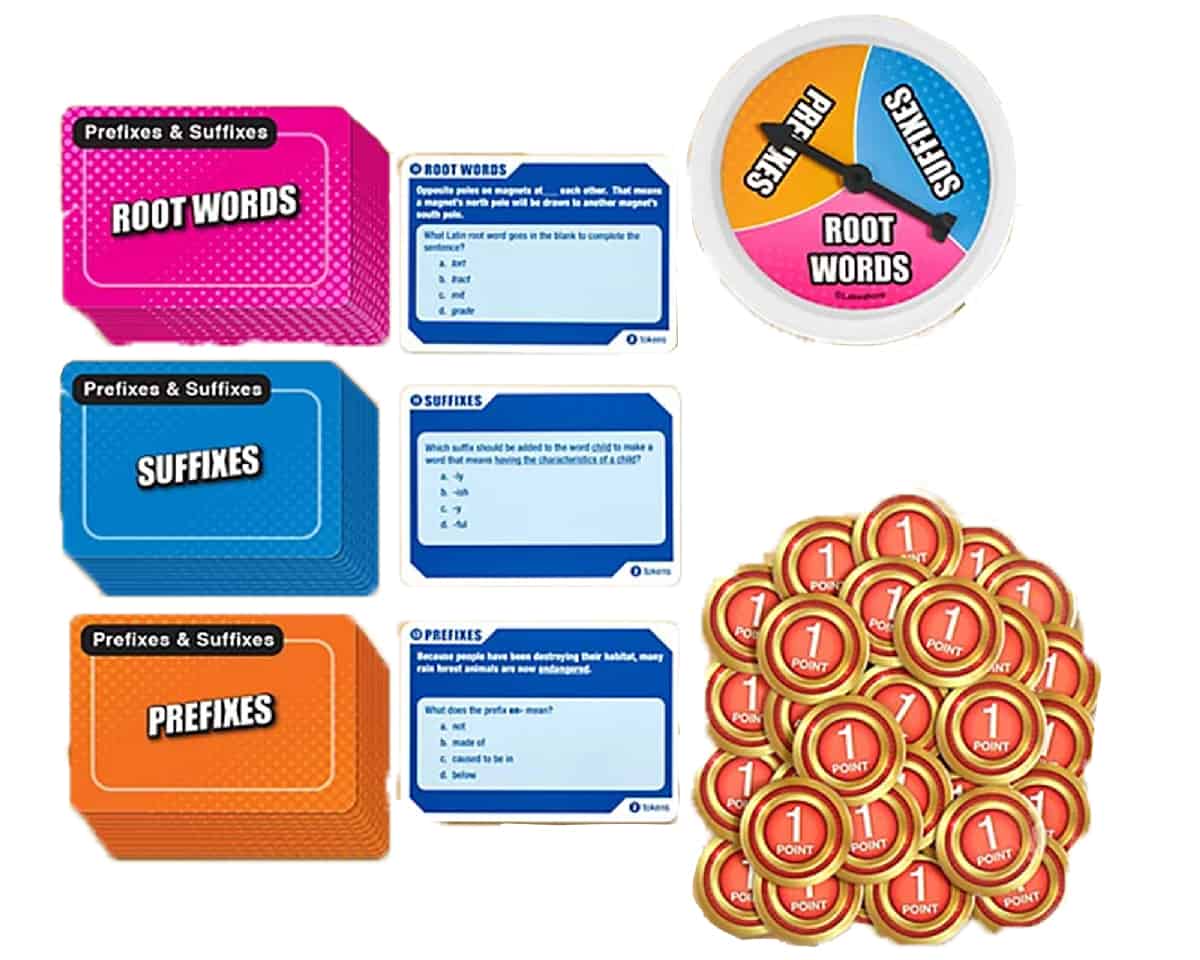
★★★★☆
For Teachers | Age 8-10 | 2-4 Players | Grade 3-4
Can Do! Prefixes & Suffixes teaches children how words can be made of root words, prefixes, and suffixes. It comprises 60 game cards, tokens, an answer card, and a spinner.
teaches children how words can be made of root words, prefixes, and suffixes. It comprises 60 game cards, tokens, an answer card, and a spinner.
Players draw a card according to the category drawn by the spinner. If they answer the question correctly, they receive tokens. You might want to avoid counting points with these tokes, as it makes the game a little too competitive for the classroom.
The detailed content is a strong point (sample sentence on top of the card, relevant options to choose from, answer card). This game is relevant because it helps understand how words can be derived using word parts.
Wordsmithery (Clarendon Games)
★★★☆☆
For Families | Age 8+ (for the easy words) | 2+ Players
Wordsmithery is a multiple-choice questions quiz game, containing 300 cards (600 words in total).
is a multiple-choice questions quiz game, containing 300 cards (600 words in total).
Players win points if they guess the correct meaning of the word out of three options. The first player or team to get ten points wins the game (takes about 20 minutes).
Highlights:
- Contains easy and difficult words (50 easy words for kids out of 600). The problem is that the words in general are not classed by difficulty (it would have enabled to adapt the game to the level of the players, manage a progression…).
- Pronunciation is included
- On the downside, the game is quite repetitive (just a quiz, nothing else)
Triple Talk Vocabulary Cards (Super Duper Inc)
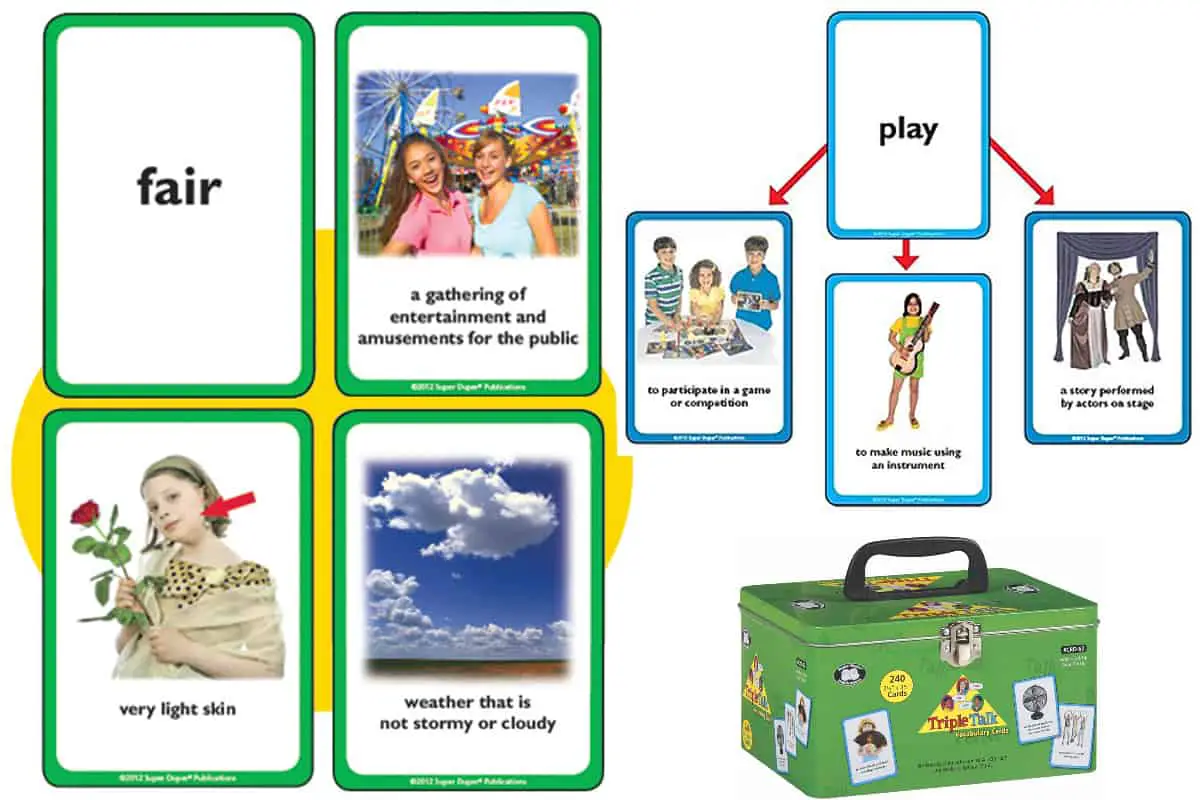
★★★★☆
For Teachers | Age 7-9 | 2-4 Players | Grades 2-3
Triple Talk Vocabulary Cards is a matching game where players have to match word cards (60 in total) with one of their three possible meanings (each having its own card with a definition and a photo: 180 photo-definition cards).
is a matching game where players have to match word cards (60 in total) with one of their three possible meanings (each having its own card with a definition and a photo: 180 photo-definition cards).
The photo-definition cards are classified according to three levels of difficulty:
- Level 1: definitions that are most familiar to students
- Level 2: definitions that are not common or less known by students
- Level 3: definitions that are generally unknown to students (the words are defined as parts of speech such as nouns, verbs and adjectives)
I give four stars because
- The content is well-thought, with 3 levels of progression in difficulty noted on the cards
- The gameplay is easy to understand and exciting (the pictures help visualize the meaning)
Just for Laughs (Super Duper Inc)
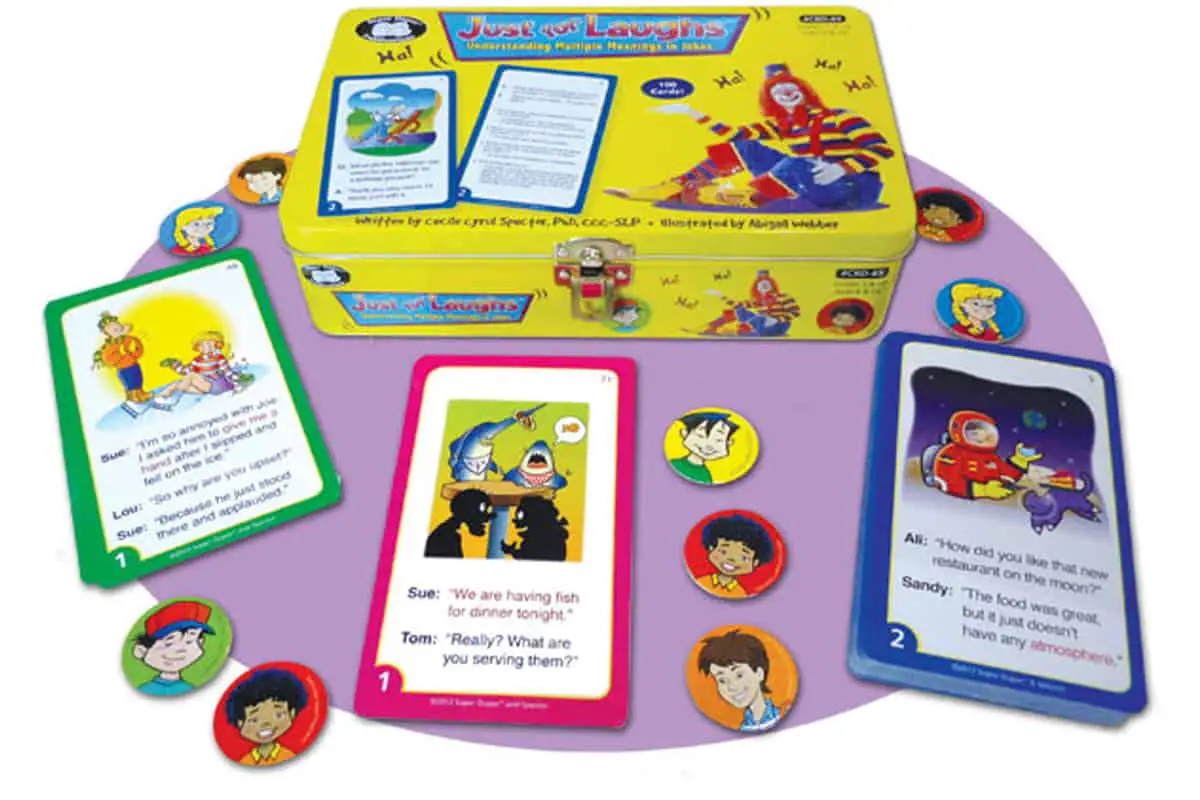
★★★★☆
For Families and Teachers | Age 8-10 | 2-4 Players | Grades 3-4
In Just for Laughs , players draw a card and quiz each other to understand why the multiple meanings of a joke make it funny. It features 100 jokes in three color-coded cards:
, players draw a card and quiz each other to understand why the multiple meanings of a joke make it funny. It features 100 jokes in three color-coded cards:
- 40 cards with multiple meaning words
- 30 cards with multiple meaning phrases
- 30 cards with multiple meaning sentences
The front side of the card contains a funny drawing and a joke. the other side has questions and answers about the joke, related to the multiple meanings of the word, phrase, or sentence.
I highly recommend “Just For Laughs” because
- Illustrations help players understand the joke
- Explanations are properly sequenced and labeled
- Children love jokes. Explainig in details how multiple meaning jokes work might seem dull (it is often sayed that a joke requiring an explanation is not funny any more), but in fact it can be fascinating for children to discover how they can crack jokes
Super Sleuth (Educational Insights)
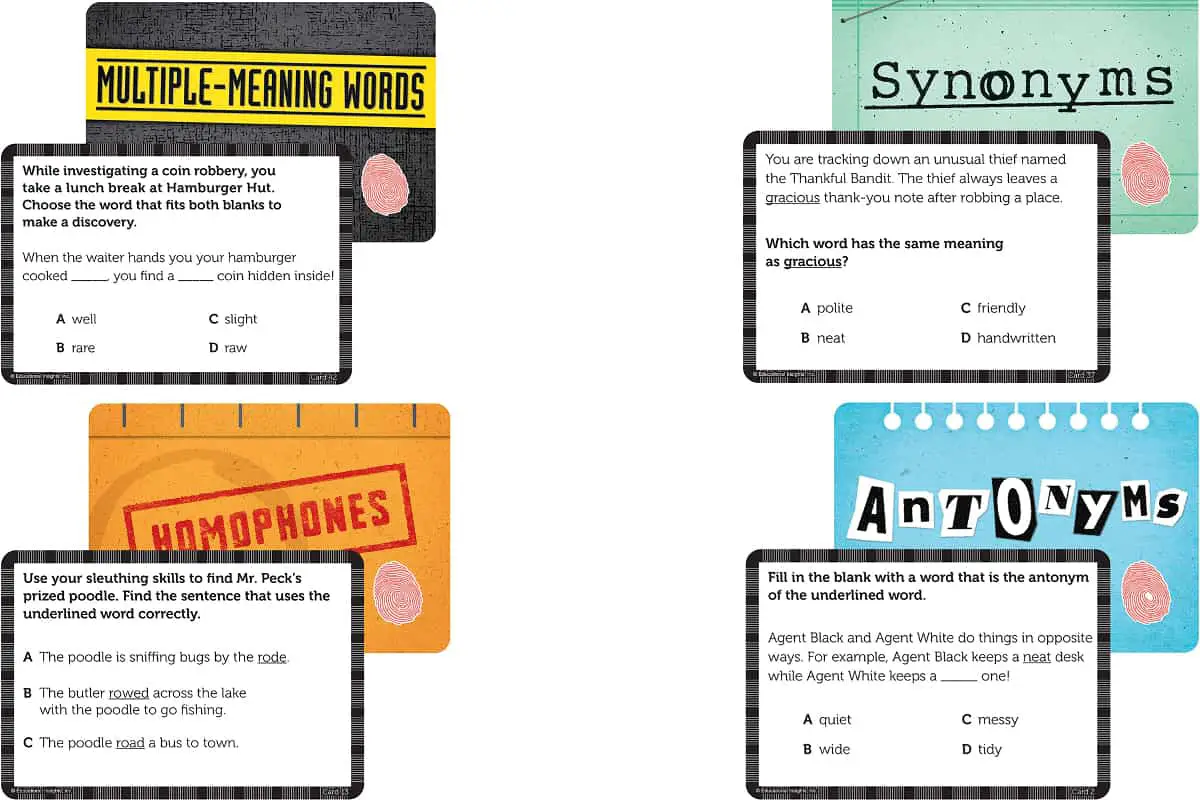
★★★☆☆
For Teachers | Age 8-10 | 2-4 Players | Grade 3-4
Super Sleuth is a detective-themed vocabulary game where players find mystery words in four categories:
is a detective-themed vocabulary game where players find mystery words in four categories:
- Synonyms
- Antonyms
- Homophones
- Multiple meaning words
The object of the game is to collect three badges in each vocabulary category.
There are 48 badges to collect from 184 cards and 16 special assignment cards. Players check their answers using a special decoder.
The first detective to collect 12 badges wins the game and earns the title “Super Sleuth”.
Here are some pros and cons:
- It is self-correcting and exciting. Children enjoy using the special decoder or the spy glass.
- It really adds fun to the “classic” MCQ format
- However, there are no real mysteries (inherent problem with MCQs)
- Some vocabulary words are too easy (Kindergarten or Grade 1 level).
Word Waffle (Edupress)
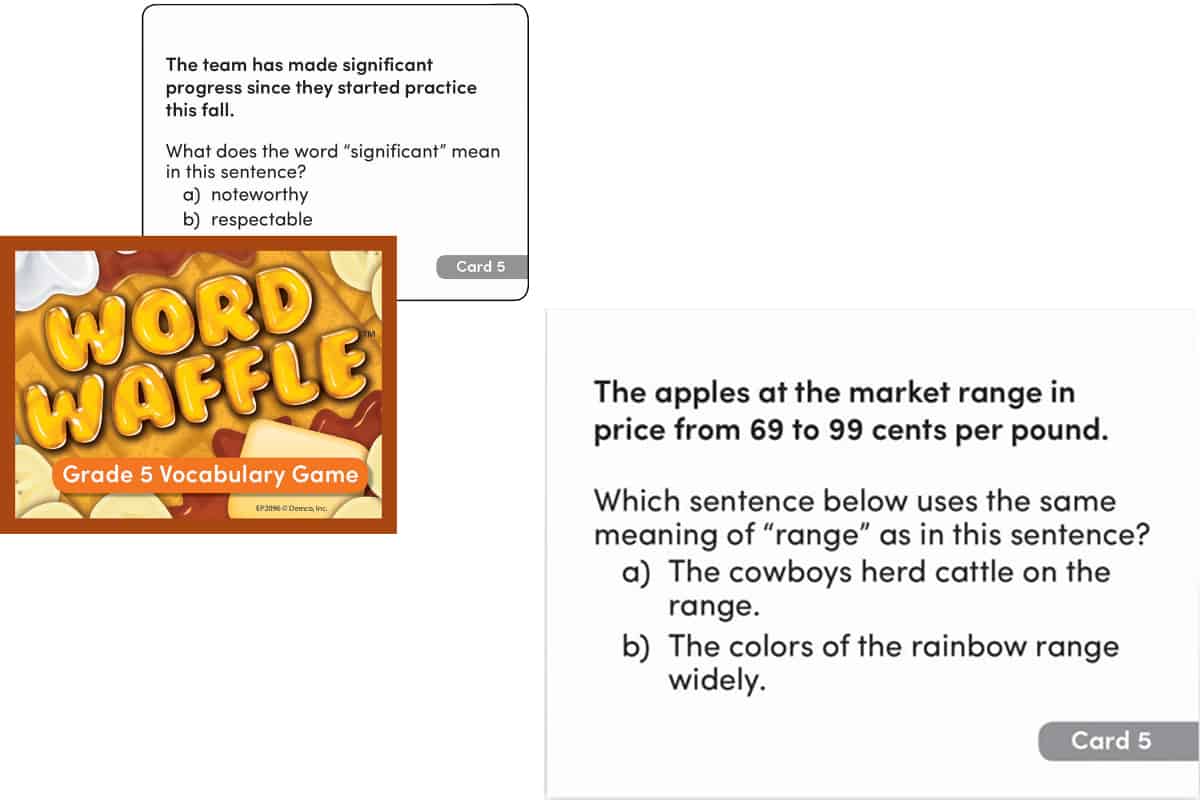
★★☆☆☆
For Families| Age 10-11 | 2-4 Players | Grade 5
In Word Waffle, players earn and lose tokens as they answer multiple-choice vocabulary questions.
players earn and lose tokens as they answer multiple-choice vocabulary questions.
This game has 150 cards, 64 tokens, and an instruction guide.
The object of the game is to have the greatest number of tokens kept at the end of the game. Players lose all their tokens when they answer incorrectly, but they have a chance to get them all back if they draw a full plate card. The playing time takes about 20 minutes.
I don’t recommend Word Waffle because compared to “super sleuth”, there is no effort to make MCQs more enticing. the game has answer keys though, which enables children to play it autonomously.
Early Learning Language Library (Key Education Publishing)
Vocabulary flashcards are also a convenient way to organize vocabulary learning (especially by managing the repetitions). They are often categorized according to purpose or themes.
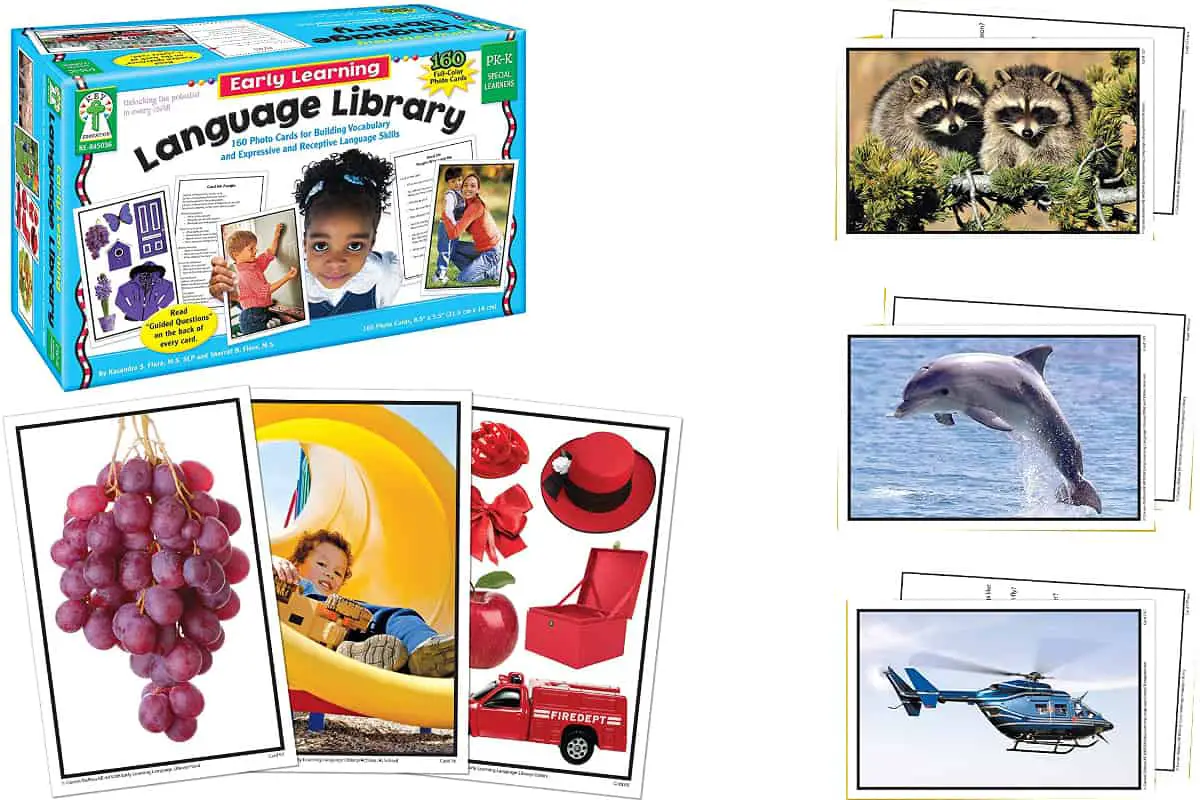
★★★★☆
For Teachers and Families | Age 3-5 | 2-4 Students
Early Learning Language Library comprises 160 picture cards that depict words in 11 categories:
comprises 160 picture cards that depict words in 11 categories:
- Actions: At School
- Actions: Taking Care of Myself
- Actions: What are they Doing?
- Colors
- Emotions
- Farm Animals
- Food
- Wild and Water Animals
- Forest Animals
- Pets
- Transportation
A resource guide contains word lists and game ideas.
The photos are quality real-life pictures (however, some are obsolete).
The backside of the card contains prompt questions that can help children with speech delays express their ideas
Other Types of Vocabulary Games
If you are interested in more vocabulary games, you might want to check the post “12 Vocabulary Board Games for Schools and Families“.
How Does Vocabulary Develop?
Vocabulary is of course built progressively every year, but to schematize it can be divided into the following three layers:
- Basic vocabulary comprises about 8000 word families and includes early reading words, sight words, and parts of speech (nouns, verbs, adjectives). These words occur in daily conversations. Most are generally known at age 8 or Grade 3.
- High-frequency vocabulary consists of 7000 word families. These words often carry multiple meanings, and comprise many abstract words. They are used in a variety of domains which are crucial in reading and speaking. They are generally expected to be mastered by 13-year-olds, or at the end of middle school.
- Low-frequency vocabulary includes jargon or specialized vocabulary in specific domains like technology, occupation, school and more. They are rarely used unless needed in the situation. Knowing them or not depends on your interests, competences and experiences. Adults generally know around 30000 words, half of them being low frequency vocabulary.
Edudingo.com is a participant in the Amazon Services LLC Associates Program, an affiliate advertising program designed to provide a means for sites to earn advertising fees by advertising and linking to Amazon.com. We also participate in other affiliate programs which compensate us for referring traffic.
